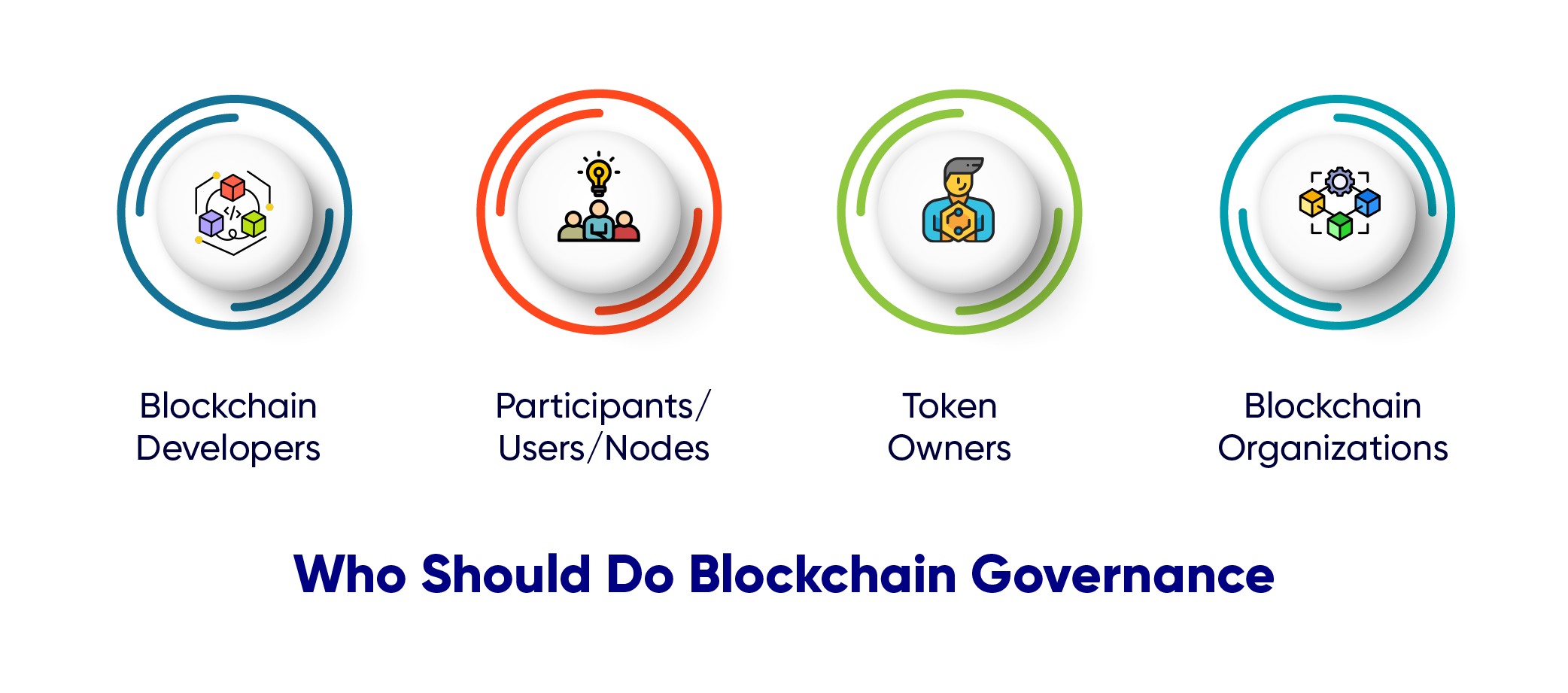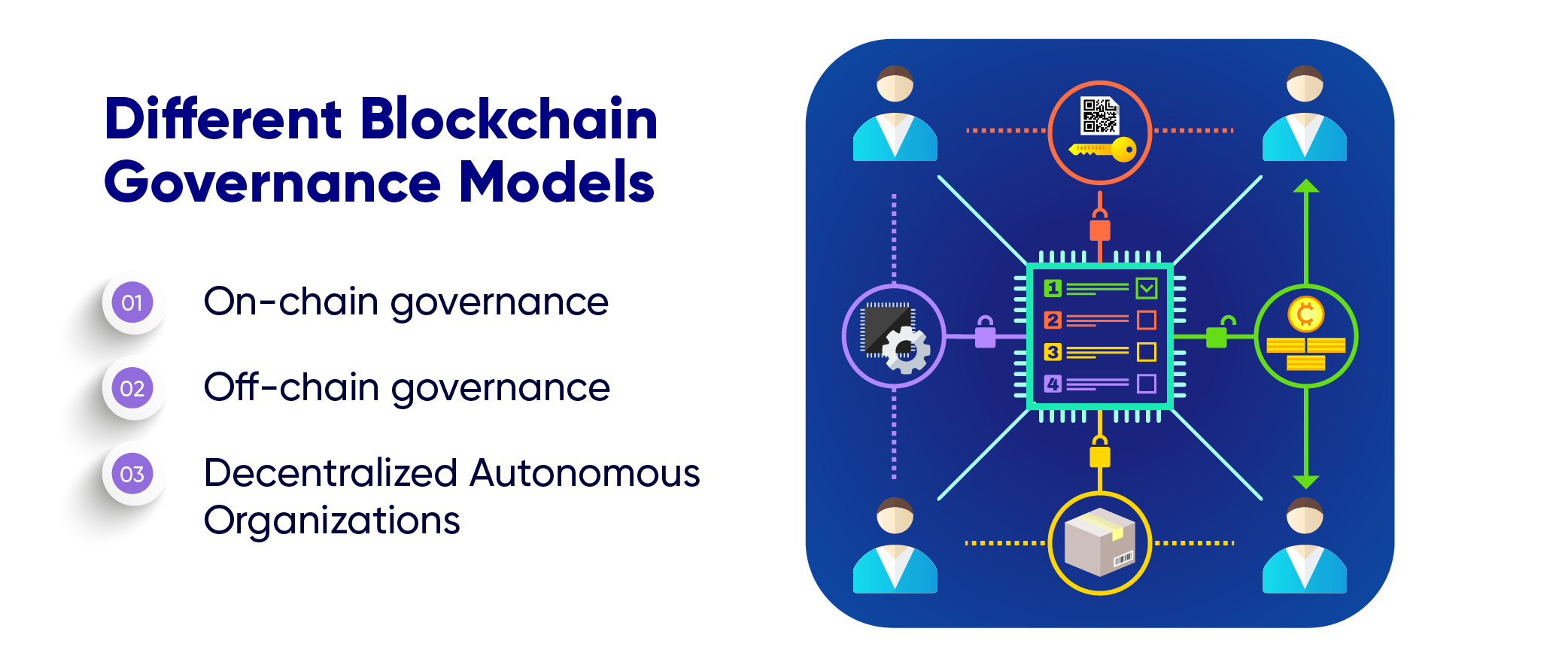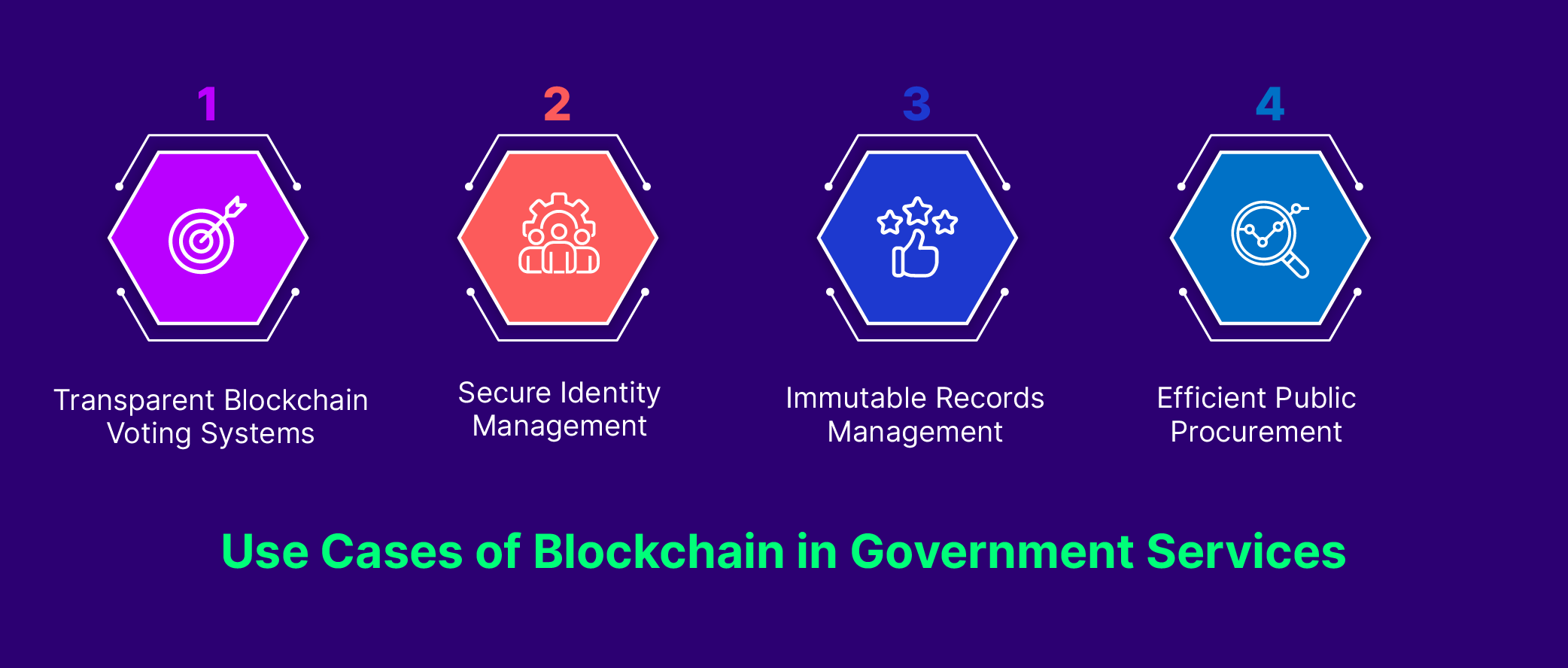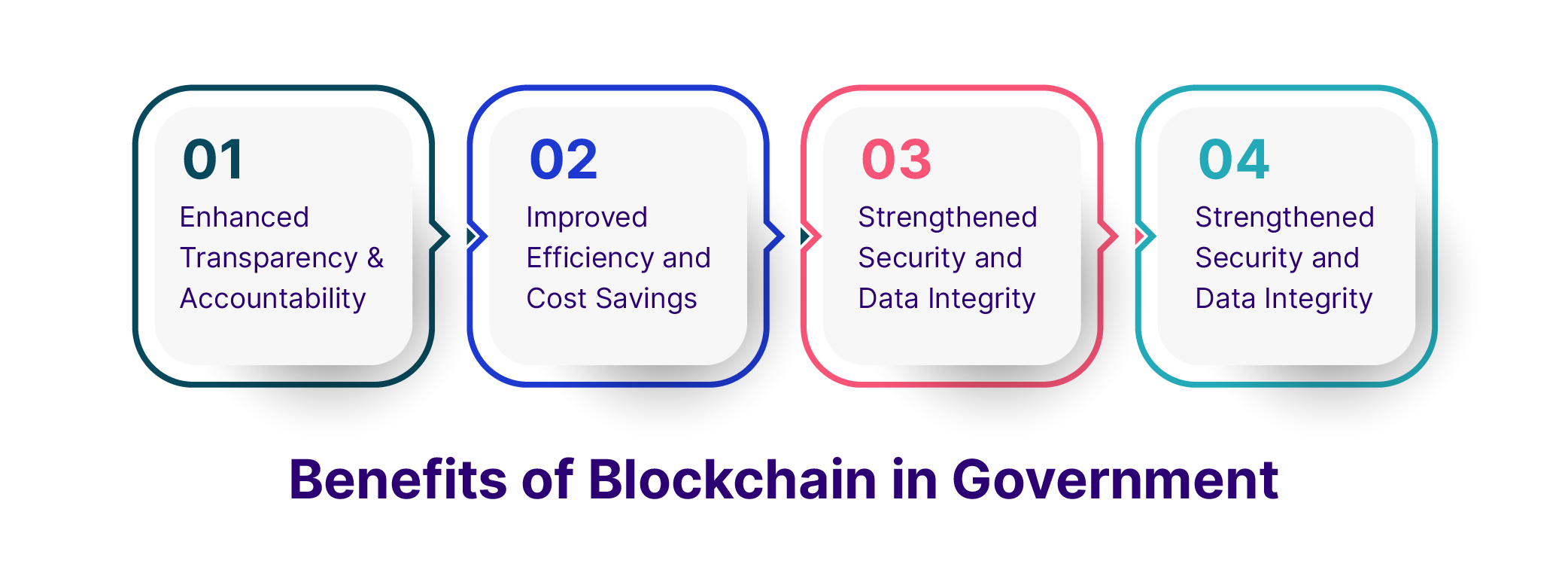
Introduction
Web3 & Blockchain Consultancy :
Blockchain and Governance: A New Era
Decisions that are made collectively to benefit everyone are called governance. Long ago, cavemen used to congregate around fires to determine where to hunt. In the modern world, our governments are more like nations with decision-making leaders. Blockchain technology has revolutionized the way we store and share data. But unlike traditional systems controlled by a single entity, blockchains operate in a decentralized manner. This raises a crucial question: how do these networks make decisions and ensure everyone agrees on the validity of transactions? The answer lies in Blockchain consensus mechanisms – the backbone of blockchain governance. In this blog, we’ll look at what blockchain governance is, blockchain in government use cases, and how blockchain implementation and consensus mechanisms in the government sector can solve governance issues.What is Blockchain Governance?
Blockchain is a secure ledger system governance that aims to ensure that the network operates smoothly, maintains security, and evolves in a manner that aligns with the interests and values of its stakeholders. It involves making decisions about protocol upgrades, changes to consensus mechanisms, network parameters, economic incentives, and other aspects that affect the overall functioning of the blockchain.
The Role of Consensus Mechanism in Blockchain Governance
Blockchain governance and blockchain consensus mechanisms are interconnected to create a secure, reliable, and functional decentralized network. Governance defines rules and processes for collective decisions within the blockchain network, while consensus mechanisms provide a way for all participants to agree on the current state of the blockchain, including transaction validity and order. Different governance models may require different consensus mechanisms depending on their priorities, such as a security-focused blockchain using a more robust but slower mechanism like Proof of Work (PoW). Consensus mechanisms are essential for achieving decentralized governance, as they allow all participants to have a say in the decision-making process. The choice of consensus mechanism significantly impacts the overall functionality of the blockchain, including security, scalability, and energy efficiency.Different Blockchain Governance Models
Different blockchain networks employ various governance models. The governance structure you choose can have significant implications for the network’s performance, security, and decentralization. Here are some common governance models in the blockchain:
1. On-chain Governance
On-chain governance involves blockchain-based governance decisions made using smart contracts or decentralized voting mechanisms. Key elements include token voting, proposals, voting period, governance tokens, decision execution, and upgradeability. It promotes transparency, accountability, and community involvement, but faces challenges like widespread participation and preventing majority tyranny.2. Off-chain Governance
Off-chain governance refers to decisions made outside of the blockchain, involving Decentralized Governance Organizations (DGOs), forums, discussions, proposals, voting mechanisms, and decision implementation. It’s beneficial in situations where immediate changes to the blockchain protocol aren’t feasible due to technical limitations.3.DAOs
Decentralized Autonomous Organizations (DAOs) operate on blockchain using smart contracts for decentralized decision-making and governance. Voting mechanisms govern these organizations, with token holders having proportional voting rights. DAO governance encompasses fund management, protocol upgrades, project proposals, and resource allocation, reducing the need for centralized authority.Use Cases of Blockchain in Government Services
There are numerous use cases of blockchain in the government sector and blockchain is already solving scalability challenges like;
- Transparent Blockchain Voting Systems: Blockchain technology can improve voting systems by making them transparent and tamper-proof. Blockchain implementation in government services can ensure the integrity of electoral processes. By recording votes on a distributed ledger, governments can eliminate fraud and manipulation, thereby enhancing trust and confidence in democratic institutions.
- Secure Identity Management: Blockchain can make identity management systems to provide citizens with secure and verifiable digital identities. It reduces the risk of identity theft and fraud. Governments can use blockchain to issue and authenticate digital IDs for accessing public services, voting, and conducting online transactions.
- Immutable Records Management: Government agencies can use blockchain to maintain immutable records of important documents and transactions, such as land titles, birth certificates, and property deeds. This reduces the risk of data tampering and ensures the authenticity and integrity of records.
- Efficient Public Procurement: Blockchain can streamline the public procurement process by providing transparency and traceability of transactions. Smart contracts can automate contract execution, ensuring compliance with procurement rules and reducing administrative overheads.
Benefits of Blockchain in Government
Blockchain Governance can offer a lot of benefits to the government. It is not only making the systems decentralized but also enhancing the overall security. Here are some of the benefits;
- Enhanced Transparency and Accountability: Blockchain technology enables transparent and auditable transactions, fostering trust between governments and citizens.
- Improved Efficiency and Cost Savings: By automating processes and reducing intermediaries, blockchain can streamline operations and reduce administrative costs.
- Strengthened Security and Data Integrity: The decentralized nature of blockchain makes it resistant to cyber attacks and data manipulation, ensuring the integrity and confidentiality of government data.
- Empowered Citizens: Blockchain-based systems empower citizens by providing them with greater control over their data and enabling seamless access to government services.
Frameworks to Implement Blockchain in Government
Implementing blockchain in government requires a robust governance framework to ensure accountability, security, and compliance with regulations. Key components of a blockchain governance framework include:- Legal and Regulatory Compliance: Governments need to establish clear regulations and policies governing the use of blockchain technology in public services. This includes addressing data privacy, security standards, and legal recognition of blockchain-based transactions.
- Consortium Governance: In cases where multiple government agencies or stakeholders are involved, establishing a consortium governance model is essential. This involves defining roles, responsibilities, and decision-making processes among participants to ensure collaboration and consensus.
- Technical Standards and Interoperability: Developing technical standards and protocols is crucial for interoperability between different blockchain systems. Governments should work towards standardizing data formats, encryption methods, and smart contract functionalities to facilitate seamless integration and data exchange.
- Security and Risk Management: Implementing robust security measures is essential to protect government data and systems from cyber threats and malicious activities. This includes implementing encryption, access controls, and regular audits to identify and mitigate potential vulnerabilities.
How Blockchain Implementation and Consensus Mechanisms Can Solve Governance Issues?
Traditional systems often lack transparency, leading to suspicion and distrust. Blockchain creates a shared ledger, visible to all participants, ensuring clear audit trails and verifiable transactions, fostering trust between government and citizens. Here is how;- Effective Governance With E-Govt: Blockchain’s immutability provides a special remedy for governance problems. E-government solutions can improve simplicity, efficiency, and trust. It can be applied to electronic voting, resolving issues with election security such as accessible polls and voter integrity. Election integrity is guaranteed in important elections by decentralized, transparent, encrypted networks that prevent manipulation. Consensus processes and the use of blockchain technology can promote cost savings, increased efficiency, decreased corruption, transparency, and trust.
- Elimination of Mediators: Centralized systems are vulnerable to corruption. Consensus mechanisms ensure all participants agree on the validity of transactions, reducing the risk of tampering while blockchain technology can combat government corruption by eliminating intermediaries in e-government services, promoting transparency and smart-contract functionality. It allows states to adopt decentralized approaches to foster real-time transparency and audibility. Blockchain also simplifies access to public information, improving efficiency and citizen engagement, and streamlining public affairs management.
- Secure Identity Management: Blockchain can automate tasks and eliminate redundant steps by offering secure identity management. E-identities can reduce cybercrimes and data breaches. However, distributed ledger technology (DLT) enables shared record-keeping and identity registration that as a result prevents breaches and ensures data protection. It also improves data security and integrity by protecting sensitive government data through consensus mechanisms. This approach helps governments and citizens protect sensitive data and identities without compromising data.
- Financial Management: Consensus algorithms track and reconcile government transactions, reducing costs and increasing efficiency. Blockchain’s nature is to improve efficiency and reduce costs in government agencies by aiding in budgeting and financial management. Blockchain-based accounting systems offer faster, permanent, and auditable reconciliation, streamlining processes, reducing redundancy, and auditing financially weak areas.
- Making Processes Streamlined: Blockchains can improve transparency in grant disbursements, a crucial process for governments to disburse millions of dollars annually for humanitarian aid, social assistance, education, and arts. It also reduces the number of actors involved in the process, leading to a streamlined process, reduced costs, and potentially eliminating opportunities for illicit financial siphoning which create increased economic rents and public trust.